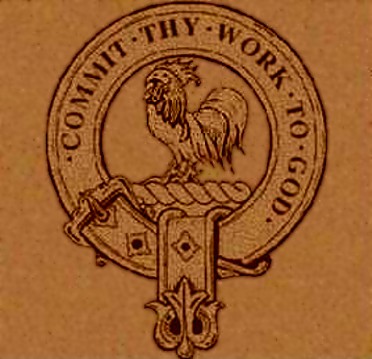Lessico
Henry Sinclair

Stemma
dell'antenato
Henry Sinclair I (1345-1400)
Henry Sinclair (1508–1565), bishop of Ross (Scotland), and lord-president of the court of session, second son of Sir Oliver Sinclair of Roslin (Scotland), and brother of Oliver Sinclair, general at Solway Moss, and of John Sinclair (died 1566), bishop of Brechin, was born in 1508. He studied at the university of St. Andrews, being incorporated in St. Leonard's College in 1521. Having gained the special favour of James V, he was admitted on November 13, 1537 an ordinary lord of session. On December 16 of the same year he obtained the rectory of Glasgow from Archbishop Dunbar; in 1541 he was named abbot or perpetual commendator of the abbey of Kilwinning; and in 1550 he exchanged this office with Gavin Hamilton for the deanery of Glasgow.
In 1548 he was sent into Flanders to treat for a peace between Flanders and Scotland. On August 11, 1550, he obtained a safe-conduct to go into France, and apparently did not return to Scotland until 1554. Immediately on his return he persuaded Robert Reid, the bishop of Orkney, then president of the court of session, to make certain statutes for the abbreviation of the processes and the reform of other abuses. He was a commissioner for the treaty of Carlisle in 1556, and for that of Upsettlington in 1559. On December 2, 1558, he succeeded the bishop of Orkney as lord president of the court of session, and on the death of Bishop David Painter in the same year, he obtained a gift of the temporalities of the see of Ross, being consecrated — after some delay in obtaining the papal sanction — in 1560. In 1561 he was chosen one of Queen Mary's privy council of twelve, the other eleven members being all laymen. The same year he and other bishops offered to give up a fourth of the rents of their benefices. On December 28, 1563, he was appointed one of a commission for the erection of jurisdiction in various parts of the country.
Apparently Sinclair possessed no special predilections for either the old or the new religion. He was content to retain the temporalities of his bishopric, and, as president of the court of session, he made it his duty to see that proper regard was paid to the laws in actual force, whether they favoured Protestants or Catholics. Thus, when the queen sought his advice in regard to the prosecution of several Catholics who had observed the mass, he advised "that she must see her laws kept, or else she would get no obedience". On the other hand, when John Knox in 1563 penned a letter to "the brethren in all quarters" to assemble for the protection of certain persons who had made forcible entrance into the chapel of Holyrood during mass, Sinclair sent a copy of the letter to the queen at Stirling. Knox, on this account, denounces him as "ane perfect hypocrite, and ane conjured enemy to Christ Jesus". Yet Knox himself admits that Sinclair voted for his absolution when brought before the council. "The bishop", he says, "answered cauldlie, 'Your grace may consider that it is neither affection to the man [Knox], nor yet love to his profession, that moveth me to absolve him; but the simple truth, which plainly appears in his defence'". It is clear that Sinclair was capable of acting justly, if not generously, towards an avowed enemy.
On the appearance of Bishop Jewell's Apologia in 1562, Randolph, the ambassador of Elizabeth in Scotland, sent a copy to the bishop of Ross, expressing at the same time his intention to send one to the archbishop of St. Andrews, "not", he says, "to do them good, which I know is impossible, but to heap mischief upon their heads". Nevertheless Randolph afterwards describes him as "of that sort of men the best in Scotland". On February 20, 1564, Queen Mary applied to Elizabeth for a safe-conduct for Sinclair to go into France, that he "might seek cure and remedie of a certain maladie". The malady was the stone, for which he underwent an operation; but he died at Paris on January 2, 1565.
Sinclair
wrote some additions to Hector Boece's![]() History
of Scotland, which his brother, John Sinclair, bishop of Brechin, brought
from Paris after his death. It is supposed that John, rather than Henry, was
the author of Sinclair's Practicks, a legal work contained in
manuscript in the Advocates' Library, Edinburgh.
History
of Scotland, which his brother, John Sinclair, bishop of Brechin, brought
from Paris after his death. It is supposed that John, rather than Henry, was
the author of Sinclair's Practicks, a legal work contained in
manuscript in the Advocates' Library, Edinburgh.